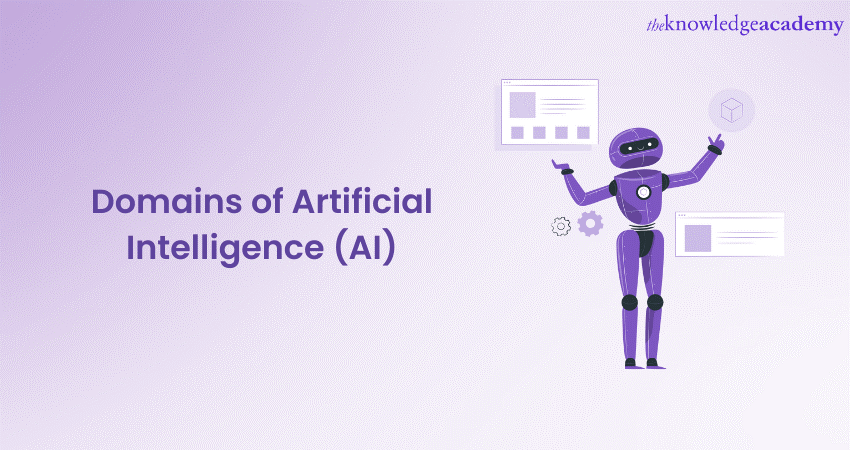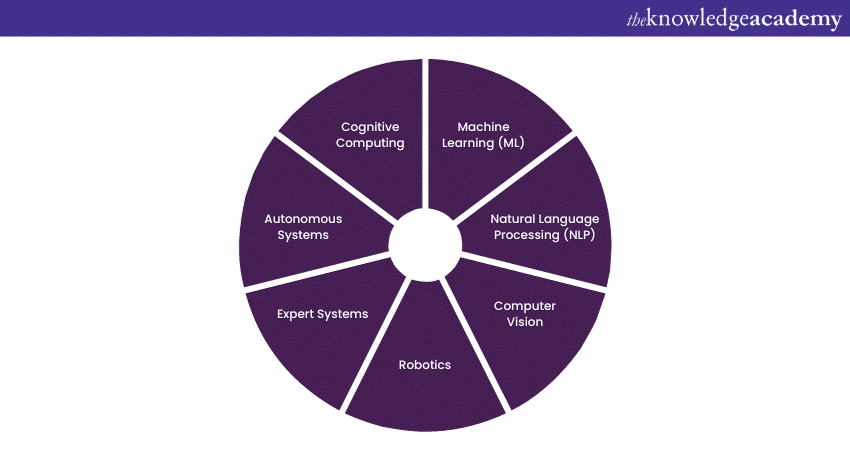We may not have the course you’re looking for. If you enquire or give us a call on +1 7204454674 and speak to our training experts, we may still be able to help with your training requirements.
Training Outcomes Within Your Budget!
We ensure quality, budget-alignment, and timely delivery by our expert instructors.

Artificial Intelligence (AI), has evolved drastically over the years, touching various aspects of our lives. It's a technology that has not only fascinated us but also significantly impacted how we live, work, and interact with the world around us. Within the vast landscape of AI, there exist several distinct Domains of Artificial Intelligence, each with its unique characteristics and applications.
According to Statista, the global AI market, with a value of billion 113.60 GBP in 2023, is on a continuous growth trajectory, primarily fuelled by substantial investments. In this blog, we will dive into the major domains of AI, explaining what they are and how they contribute to shaping our future. Keep reading this blog to learn more as we thoroughly explain Domains of Artificial Intelligence, their interconnected nature and future potential.
Table of Contents
1) The major Domains of Artificial Intelligence
a) Machine Learning (ML)
b) Natural Language Processing (NLP)
c) Computer vision
d) Robotics
e) Expert systems
f) Autonomous systems
2) The interconnected nature of AI Domains
3) The future of AI domains
4) Conclusion
The major Domains of Artificial Intelligence
When Domains of Artificial Intelligence are discussed, people refer to specific areas or fields of study and application within AI. These domains encompass a wide range of techniques, algorithms, and technologies tailored to address particular challenges and tasks. These domains have emerged as AI has matured and diversified, meeting the needs of different industries and problem-solving scenarios, some major ones being as follows:
Fascinated by the world of ever evolving technology? Try our Artificial Intelligence & Machine Learning Courses and unleash the true potential of technology!
Machine Learning (ML)
Machine Learning (ML) is perhaps one of the most well-known and widely used domains of AI. It focuses on developing complex algorithms and models that allow machines to learn from A set of data and make predictions or decisions. ML finds applications in various fields, such as healthcare (for diagnosis and prognosis), finance (for fraud detection), and Natural Language Processing (for chatbots and language translation). It's the foundation upon which many other AI domains build.
Natural Language Processing (NLP)
Natural Language Processing (NLP) is all about enabling computers to understand, interpret, and generate human language. This domain is crucial for chatbots, language translation, sentiment analysis, and speech recognition systems. NLP algorithms make it possible for AI to interact with people in a more organic and conversational manner.
Computer Vision
Computer Vision focuses on teaching machines to interpret the visual information from their surroundings. It's employed in applications like facial recognition, object detection, autonomous vehicles, and medical image analysis. Computer vision enables AI systems to "see" and interpret the visual world much like humans do.
Robotics
Robotics involves the integration of AI with physical machines. This domain has given rise to robots capable of performing tasks such as autonomous navigation, picking and placing objects, and even surgery. The combination of AI and robotics has the potential to revolutionise industries like Manufacturing, Healthcare, and Logistics.

Expert Systems
Expert Systems aim to replicate the decision-making abilities of human experts in specific domains. These systems are created to solve complex problems by applying knowledge and rules. They are used in fields like medicine (for diagnosis and treatment recommendations) and finance (for investment advice).
Autonomous Systems
Autonomous Systems encompass various AI domains working together to create machines or software that can operate independently without human intervention. This includes autonomous cars, drones, and even smart home devices. These systems rely on AI to perceive their environment and make decisions in real-time.
Cognitive Computing
Cognitive Computing aims to build Artificial Intelligence systems that can mimic human thought processes, including reasoning, problem-solving, and decision-making. These systems are employed in fields like healthcare (for disease diagnosis) and customer service (for chatbots with advanced reasoning abilities).
Inspired by the concept of Robotics? Learn all about it with our Introduction to Artificial Intelligence Training!
The interconnected nature of AI domains
It's important to note that the various Artificial Intelligence Domains are not isolated entities. They often overlap and work in tandem to solve complex problems. For instance, autonomous vehicles incorporate computer vision, machine learning, and reinforcement learning to navigate and make decisions on the road. Similarly, AI-powered chatbots combine NLP, machine learning, and cognitive computing to provide efficient and context-aware customer support.
Interested in building Neural Networks? Try our Deep Learning With TensorFlow Training!
The future of AI domains
The domains of AI are continually evolving, driven by advancements in technology, research, and industry demands. As Artificial Intelligence (AI) becomes more sophisticated, we can expect to see new domains emerge and existing ones expand their capabilities. Here are a few trends shaping the future of AI domains:
1) Ethical AI: With AI's increasing influence on society, there is a growing emphasis on ethical practices. This involves addressing bias in its algorithms, ensuring transparency, and considering the social and ethical implications of AI technologies.
2) AI in Edge Computing: The integration of AI with edge computing devices (such as smartphones and IoT devices) is on the rise. This trend enables real-time, on-device AI processing, reducing latency and improving privacy.
3) Quantum AI: Quantum computing promises to revolutionise Artificial Intelligence by solving complex problems exponentially faster than classical computers. Quantum AI has the potential to impact domains like cryptography, optimisation, and material science.
4) AI in space exploration: AI is becoming increasingly crucial in space exploration, aiding in autonomous navigation, data analysis, and the search for extraterrestrial life. As space exploration expands, so does the role of AI.
5) AI for sustainability: AI is being harnessed to address global challenges such as natural disasters, climate change and resource management. Domains like AI in agriculture and energy optimisation are contributing to sustainability efforts.
Conclusion
In conclusion, various Domains of Artificial Intelligence are responsible for driving innovation across industries, from healthcare to transportation, with ongoing ethical considerations. The evolving synergy among AI domains will define its societal impact. Exciting developments await in the ever-evolving world of AI.
Put your coding skills to use in AI! Try our Natural Language Processing (NLP) Fundamentals With Python Course today!
Frequently Asked Questions
Upcoming Programming & DevOps Resources Batches & Dates
Date
 Java Programming
Java Programming
Mon 13th Jan 2025
Mon 10th Mar 2025
Mon 19th May 2025
Mon 21st Jul 2025
Mon 15th Sep 2025
Mon 17th Nov 2025
Mon 15th Dec 2025







 Top Rated Course
Top Rated Course



 If you wish to make any changes to your course, please
If you wish to make any changes to your course, please


